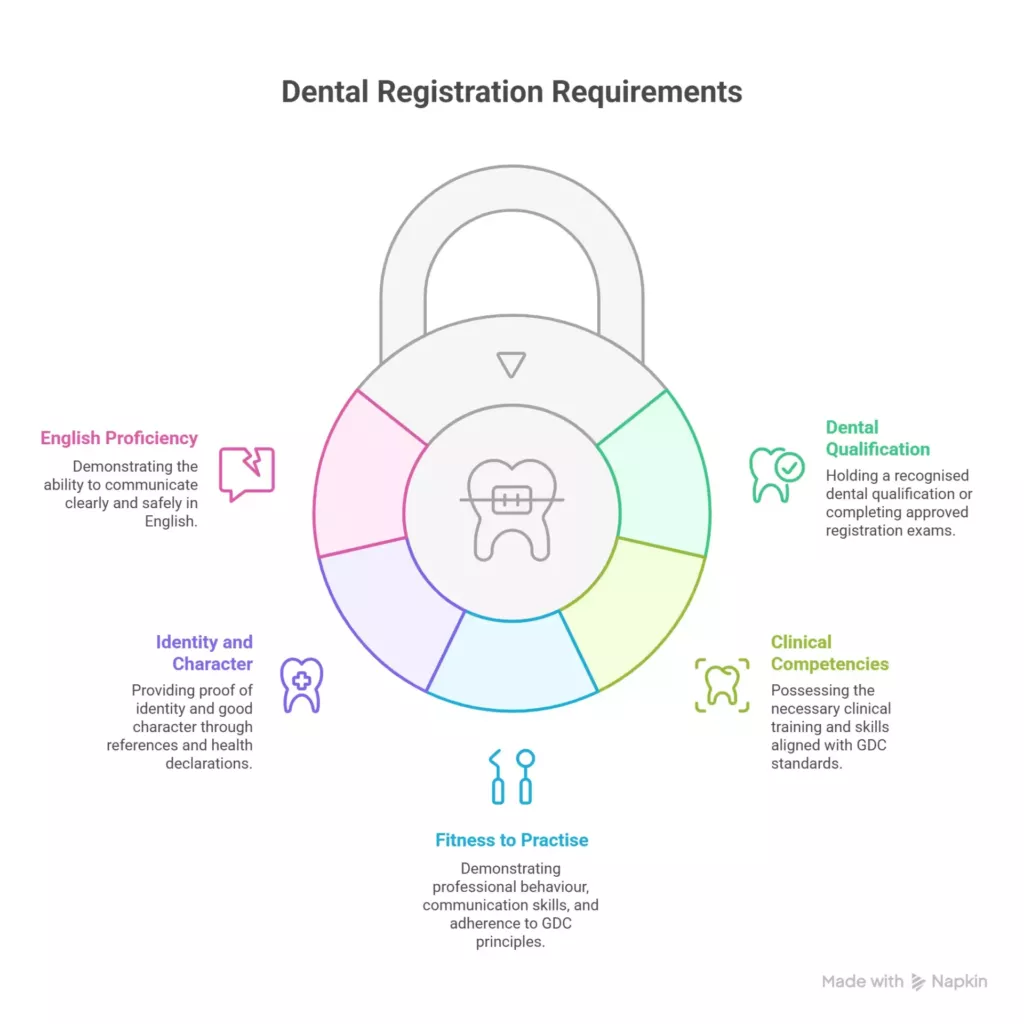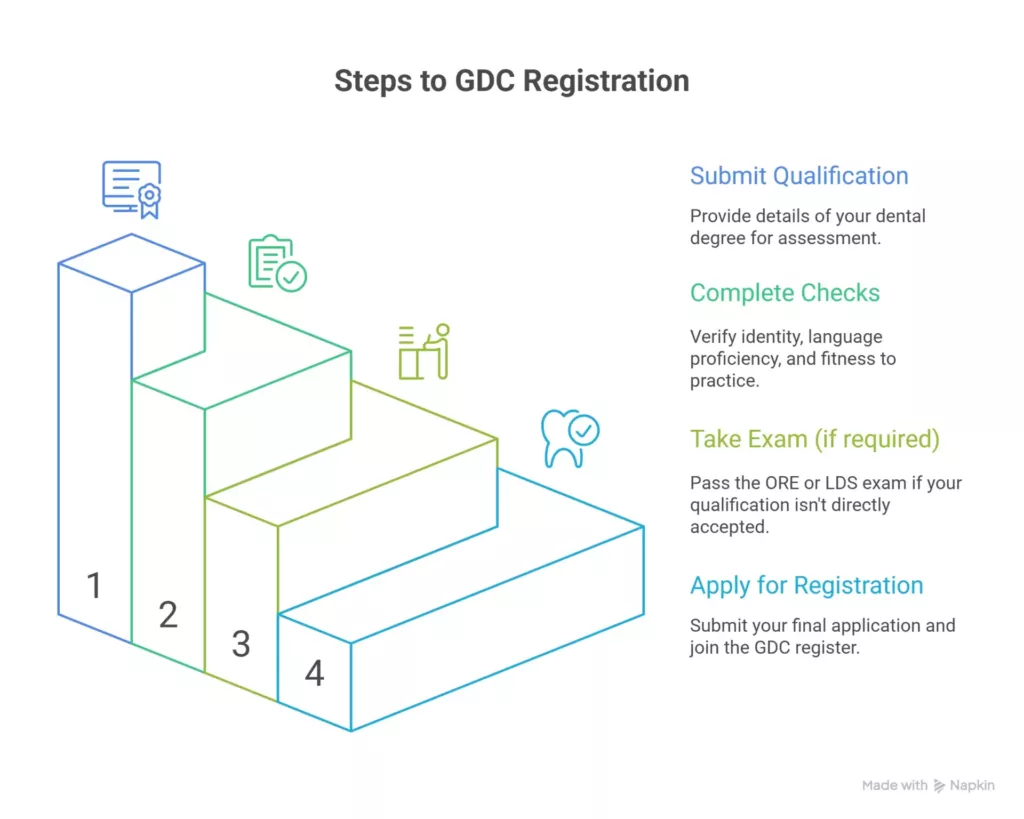2026 GDC Registration Guide for Dentistry Students in Europe

Before you even think about studying dentistry, applications, entrance exams, or which European city you’d like to call home for the next several years, there’s 1 organisation you need to know about: the General Dental Council (GDC) in the UK.
The GDC is the official regulatory body for dental professionals in the United Kingdom. Whether you’re a UK applicant who wants to study dentistry in Europe, or an international student aiming for a UK dental career, registering with the GDC is non-negotiable.
In short, if you want to work as a dentist (or other dental professional) in the UK, you will eventually pass through the GDC.
The key takeaways in this blog include:
- After Brexit, EU/EEA (European Economic Area) dental degrees are near-automatically accepted for GDC UK registration until 2028, as long as they were listed in the Directive 2005/36/EC (list of countries further in the blog).
- Many European universities fulfill all GDC criteria and give eligibility for registration.
- Your degree must meet all GDC requirements and learning outcomes to grant eligibility.
- Overseas graduates are often required to go through an individual assessment for GDC registration or sit either the Overseas Registration Exam (ORE) or the License in Dental Surgery (LDS).
- Both the ORE and LDS exams are equally accepted for GDC UK registration.
- A minimum of 1,600 hours of clinical experience are required to be eligible to sit the ORE exam.
- Medlink Students helps you avoid risky programmes by guiding you toward UK-compatible universities and checking GDC recognition routes before you apply.
Please keep in mind that GDC policies may change. Always refer to the official GDC website or speak to a Medlink advisor for the latest updates.
Table of Contents
- 1 What Is the General Dental Council (GDC)?
- 2 What Are the GDC Requirements?
- 3 What a Dental Degree Must Provide for GDC Registration or ORE/LDS Eligibility
- 3.1 A 5-year, full-time dentistry programme (or equivalent)
- 3.2 Significant supervised clinical experience with real patients
- 3.3 A curriculum that covers all GDC learning domains
- 3.4 Training that prepares graduates for independent practice
- 3.5 Assessment methods similar to UK standards
- 3.6 The qualification must be recognised by the country where you study
- 3.7 Degree requirements for GDC registration in a nutshell
- 4 Licensing Exams for Dentistry: ORE vs LDS
- 5 Steps to Register with the GDC After Studying Dentistry Abroad
- 6 European Countries with UK-aligned Dental Programmes
- 7 Top European Universities with Dentistry Programmes That Align with GDC Standards
- 8 How Medlink Students Helps You Start Off on the Right Track
- 9 Why This Matters
- 10 FAQ: GDC Registration, Studying Dentistry in Europe & UK Recognition
- 10.1 What is the General Dental Council (GDC)?
- 10.2 How do I check the GDC register?
- 10.3 Are European dentistry degrees still recognised by the GDC after Brexit?
- 10.4 How do I know if my dental degree is GDC-recognised?
- 10.5 What happens if my degree isn’t recognised by the GDC?
- 10.6 What is the Overseas Registration Exam (ORE)?
- 10.7 What is the LDS exam?
- 10.8 Is it hard to get on the GDC register after studying abroad?
- 10.9 What documents do I need for GDC registration?
- 10.10 Can Medlink Students help me choose a GDC-compatible programme?
- 10.11 Why is GDC registration important?
What Is the General Dental Council (GDC)?
The General Dental Council (GDC) is the official body that regulates dental professionals in the UK.
Its main job is to protect patients by making sure everyone who works in dentistry meets high professional and clinical standards. The GDC sets the rules for the profession, oversees training requirements, and runs the GDC register, which has every dentist and dental care professional legally allowed to practise in the UK.
However, the GDC doesn’t just regulate dentists. It also oversees dental hygienists, dental therapists, orthodontic therapists, dental nurses, clinical dental technicians, and dental technicians.
Essentially, anyone who wants to treat patients in the UK must be on the GDC dental register.
What Are the GDC Requirements?
To work as a dentist in the UK, you must meet the GDC’s requirements and qualify for GDC UK registration. These ensure that every dentist has the right training, knowledge, and skills to treat patients safely and professionally.


At the core, the GDC requires that you:
- Hold a recognised dental qualification or complete an approved registration route such as the ORE or LDS exams.
- Have the correct clinical training and competencies, including clinical experience, treatment planning, patient care, and theoretical knowledge that aligns with GDC standards.
- Be fit to practise, which means showing professional behaviour, communication skills, and following the GDC principles set out in Standards for the Dental Team.
- Provide proof of identity and good character. The GDC may check references, health declarations, and your ability to work safely with patients.
- Demonstrate English language proficiency to ensure you can communicate clearly and safely.
Additionally, a minimum of 1,600 hours of clinical experience are required for ORE exam eligibility.
What a Dental Degree Must Provide for GDC Registration or ORE/LDS Eligibility
The GDC checks whether your dental degree meets the Learning Outcomes for Registration, the same competencies UK BDS graduates must achieve.
Here is what that actually means in practical terms:
A 5-year, full-time dentistry programme (or equivalent)
The GDC expects training comparable to a UK 5-year Bachelor of Dental Surgery (BDS). Degrees shorter than this are often not considered equivalent and may require the ORE.
Significant supervised clinical experience with real patients
Your degree must include hands-on treatment of patients, not only simulation.
This includes supervised experience in:
- Restorative dentistry
- Oral surgery
- Periodontology
- Endodontics
- Prosthodontics
- Paediatric dentistry
- Orthodontics (diagnosis + referral skills)
- Dental emergencies and pain management
The GDC checks whether graduates can perform these treatments safely and independently at the level expected of a UK dentist.
A curriculum that covers all GDC learning domains
Your degree must demonstrate outcomes in:
- Clinical skills (assessment, diagnosis, treatment)
- Scientific knowledge (biomedical, dental, and material sciences)
- Professionalism and ethics
- Patient communication and consent
- Leadership and management
- Health and safety, infection control, radiography
If these domains are missing or incomplete, the qualification is unlikely to be acceptable for direct registration.
Training that prepares graduates for independent practice
The GDC checks whether graduates:
- Can examine, diagnose, and treatment-plan safely
- Can manage common dental diseases and emergencies
- Understand risk, consent, and safeguarding
- Can make safe clinical decisions
- Recognise when to refer patients
These skills are essential whether you register directly or sit the ORE/LDS.
Assessment methods similar to UK standards
To be accepted, the dental programme must use formal assessments such as:
- Clinical case evaluations
- OSCEs
- Written exams
- Continuous assessment
- Competency-based evaluations
The qualification must be recognised by the country where you study
The GDC requires that your degree is officially accredited by the medical or dental authority in that country and that you are legally allowed to practise as a dentist in the country where you graduated.
If you cannot register as a dentist in that country, the GDC will not accept the qualification.
Degree requirements for GDC registration in a nutshell
A dental degree must be equivalent in structure, content, and clinical training to a UK 5-year BDS. If it isn’t, graduates will need to take the ORE or LDS before joining the GDC register.
Ensure your dental degree is GDC compliant. Speak to our academic advisors:
Check your email to Book a FREE call
with an expert advisor
Look at your promotions/spam folders, just in case.
Licensing Exams for Dentistry: ORE vs LDS
Often, you’ll need to pass a licensing exam to join the GDC register. The 2 main routes are the Overseas Registration Exam (ORE), run by the GDC and the License in Dentan Surgery (LDS), run by the Royal College of Surgeons of England (RCS England).
Both exams assess whether your skills and knowledge match the level expected of a newly qualified UK dentist.
ORE
The ORE is the most common route for overseas-trained dentists. It’s split into 2 parts:
- Part 1 - a written exam covering clinical science, dental practice, and problem-solving.
- Part 2 - a practical exam testing hands-on skills, patient care, and clinical decision-making.
LDS
The LDS is an alternative to the ORE. It has 3 stages:
- Part 1 - a written exam testing applied dental sciences and clinical knowledge.
- Part 2 - a practical exam assessing practical, OSCE, and unseen cases.
- Part 3 - a clinical skills exam using a dental manikin to assess safe and competent operative practice.
The LDS is held less frequently and places are limited, but it serves the same purpose as the ORE.
Which exam should you choose?
Both exams are accepted for registration with the General Dental Council, and neither is “easier”. They simply operate independently. Most students apply for both, as places can fill up quickly.
Here’s a quick comparison table:
| Feature | ORE | LDS |
| Who runs it? | General Dental Council (GDC) | Royal College of Surgeons of England (RCS England) |
| Purpose | Route to GDC registration for overseas graduates | Alternative route to GDC registration |
| Format | Part 1: written exam Part 2: practical/clinical exam | Part 1: written examPart 2: practical, OSCE, unseen cases. Part 3: manikin/practical skills exam. |
| Availability | More frequent sittings, but with limited places, around ~600 places Part 1 and ~150 places for Part 2. | Less frequent. About ~120 available spots for Part 1, ~96 for Part 2 and ~36 for Part 3. |
| Difficulty | Similar | Similar |
| Cost | Set by the GDC and varies by year. Typically, around £5,000 total for registration, Part 1 and Part 2. | Set each year by RCS England. Typically, around £900 for Part 1, £1,575 for Part 2, and £1,525 for Part 3. |
| Acceptance | Accepted for GDC registration | Accepted for GDC registration |
Reserve Your Spot for Our Webinar
Steps to Register with the GDC After Studying Dentistry Abroad


If you’ve completed your dental degree outside the UK, how you join the GDC register depends on whether you graduated from an EEA/Swiss or a non-EEA country. Here’s what you can expect.
Step 1: Submit Your Qualification to the GDC
Both EEA/Swiss and non-EEA graduates must provide details of their dental degree so the GDC can assess whether it meets the learning outcomes required for UK dentists.
- EEA/Swiss graduates: some degrees may be accepted for direct registration depending on the university, curriculum, and graduation year.
- Non-EEA graduates: most will proceed to the exam route unless the GDC confirms their qualification is equivalent.
Step 2: Complete Checks on Identity, English Language, and Fitness to Practise
All applicants, regardless whether they are EEA/Swiss or non-EEA graduates must provide:
- Proof of identity
- English language evidence
- Health and character declarations
Step 3: Take an Exam (if required)
If the GDC determines that your qualification does not meet the criteria for direct registration, you will need to sit ORE or LDS. Passing either exam enables you to move forward with GDC registration.
Step 4: Apply to Join the GDC Register
Once your qualification is accepted you can submit your final application, pay the registration fee, and join the GDC dental register.
Congratulations, now you are legally allowed to work as a dentist in the UK.
European Countries with UK-aligned Dental Programmes


Before Brexit, dental qualifications from several EU and EEA countries were automatically accepted in the UK under Directive 2005/36/EC (now they are semi-automatically recognised). This includes countries such as Belgium, Bulgaria, the Czech Republic, Denmark, Germany, Estonia, Greece, Spain, France, Croatia, Ireland, Italy, Cyprus, Latvia, Lithuania, Luxembourg, Hungary, Malta, the Netherlands, Austria, Poland, Portugal, Romania, Slovenia, Slovakia, Finland, Sweden, and the United Kingdom.
This list helps students understand which education systems are historically aligned with UK standards.
Honourable mentions for increasingly popular destinations to study dentistry abroad are Georgia, Serbia, and Bosnia & Herzegovina.
Not sure if your chosen university meets all GDC requirements?
Our advisors can verify this and guide you toward UK-compatible programmes. Book a free consultation with Medlink Students.
Top European Universities with Dentistry Programmes That Align with GDC Standards
Many European programmes have strong clinical training, solid academic foundations, and a great track record of graduates successfully registering in the UK.
Here are some of the top European universities with the most well-established dentistry programmes in English:
- European University Tbilisi, Georgia
- Pavol Jozef Safarik University, Slovakia
- University of Novi Sad, Serbia
- Medical University of Lodz, Poland
- Riga Stradins University (RSU), Latvia
- Lithuanian University of Health Sciences (LMSU), Lithuania
- Caucasus International University, Georgia
- Pecs University, Hungary
- Masaryk University, the Czech Republic
- Saint Camillus International University of Health, Italy
- Alte University, Georgia
- Semmelweis University of Medicine, Hungary
- Charles University, Czech Republic
- Medical University of Silesia, Poland
- The Catholic University of Murcia Cartagena Campus, Spain
- Medical University of Warsaw, Poland
- Universidad Europea in Spain
How Medlink Students Helps You Start Off on the Right Track
Medlink Students offers the Student Success Programme (SSP) to help students by:
- Recommending universities with strong track records for GDC UK registration
- Preparing your long-term pathway back to the UK before you even start studying
- Providing on-ground support to help you get settled in when you start studying
Our advisors make sure you choose a degree that keeps your UK career options open.
Why This Matters
Every year, countless students make the same mistake by choosing a dental school without checking whether the degree will actually allow them to work in the UK. Many only discover the problem after graduating, when the GDC tells them they can’t register.
It’s a heartbreaking situation, and it’s completely avoidable.
The truth is, not all European dental degrees are created equal. Some universities consistently produce graduates who register smoothly with the GDC, while others leave students stuck and unable to work as dentists in the UK without extra steps.
This is exactly why choosing the right university from the start matters so much.
Medlink Students makes sure you don’t gamble with your future. We guide you toward reputable, UK-compatible programmes with strong clinical training and a history of graduates successfully joining the GDC dental register. With our support, you’ll know exactly which universities are safe options, what your registration route will look like, and how to avoid common mistakes that catch students out.
Book a free consultation with Medlink Students and let us help you choose a dental programme that protects your future in the UK.
FAQ: GDC Registration, Studying Dentistry in Europe & UK Recognition
What is the General Dental Council (GDC)?
The General Dental Council is the UK’s regulator for dental professionals. It maintains the GDC register, sets professional standards, and ensures that anyone practising dentistry in the UK is properly trained and fit to practise.
How do I check the GDC register?
You can search the GDC register using the official GDC search register tool on the GDC website. This allows you to check whether a dentist or dental care professional is currently registered in the UK.
Are European dentistry degrees still recognised by the GDC after Brexit?
The General Dental Council (GDC) now assesses each European qualification individually. Whether your degree is accepted depends on the exact degree title, year of graduation, curriculum, clinical training and whether your qualification appears on the relevant list (Annex V of Directive 2005/36/EC). Always check your specific programme, not just your country.
How do I know if my dental degree is GDC-recognised?
The GDC does not publish a global list of recognised overseas universities. To check recognition, you must:
- Review the GDC guidance for overseas dentists
- Compare your programme to GDC learning outcomes
- Check whether graduates from that university have joined the GDC dental register
Medlink Students can help you pick a university that aligns with all GDC requirements.
What happens if my degree isn’t recognised by the GDC?
If the GDC does not accept your qualification for direct registration, you must pass a licensing exam such as the ORE or LDS. Without this, you cannot join the GDC register or work as a dentist in the UK.
What is the Overseas Registration Exam (ORE)?
The ORE is a 2-part exam for overseas-trained dentists whose qualifications don’t meet the GDC’s criteria for direct registration. It tests whether your skills match the level expected of a UK-trained dentist.
What is the LDS exam?
The LDS (Licensing Examination) by the Royal College of Surgeons of England is a 3-part exam and an alternative to the ORE that is also accepted by the General Dental Council for UK registration.
Is it hard to get on the GDC register after studying abroad?
Not at all, if you study at an accredited and high-quality dental school. Many European universities have strong UK-compatible programmes and graduates who register smoothly. Choosing the right university from the beginning makes a huge difference.
What documents do I need for GDC registration?
Most applicants must provide proof of identity, dental degree documentation, English language proficiency evidence, good character and health declarations and fee payment.
Extra documents may be required for overseas qualifications.
Can Medlink Students help me choose a GDC-compatible programme?
Absolutely. Medlink Students specialises in guiding applicants toward UK-compatible dental programmes in Europe. We help you avoid universities with weak GDC outcomes and choose a degree with a smooth pathway to the GDC dental register.
Why is GDC registration important?
You cannot legally work as a dentist in the UK without being on the General Dental Council register. Registration protects patients and ensures all dental professionals meet the GDC UK standards.
Leave a Reply


About Medlink Students
Leading international recruitment company for medical students in Europe. British Council Certified Agents. 10+ years of experience and more than 10,000 students advised.








